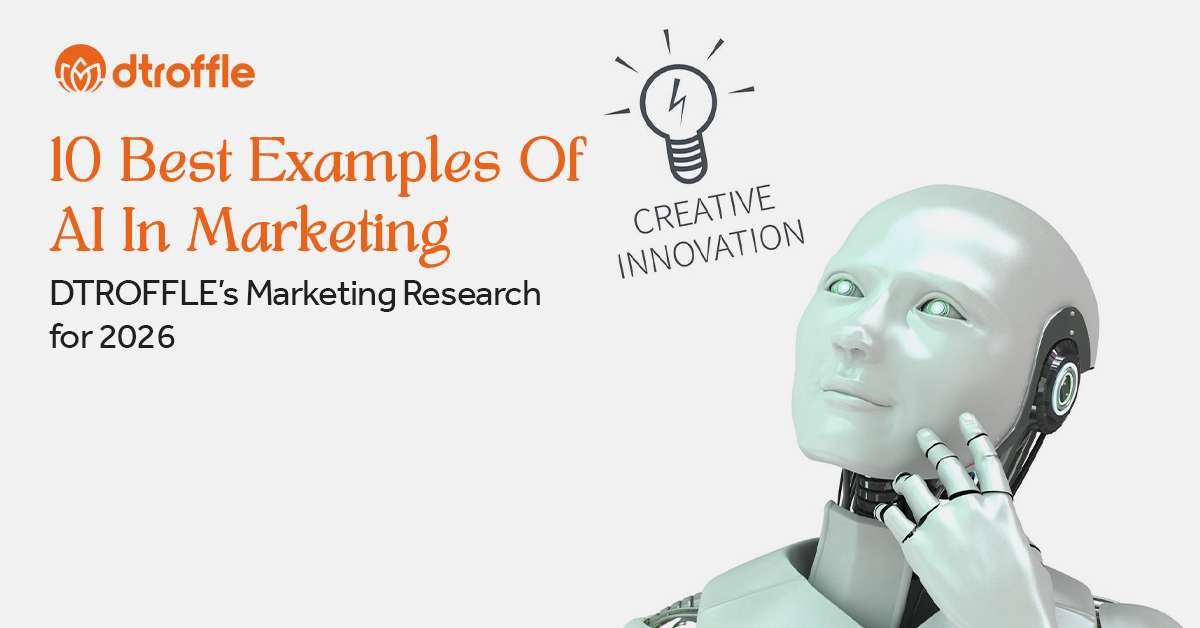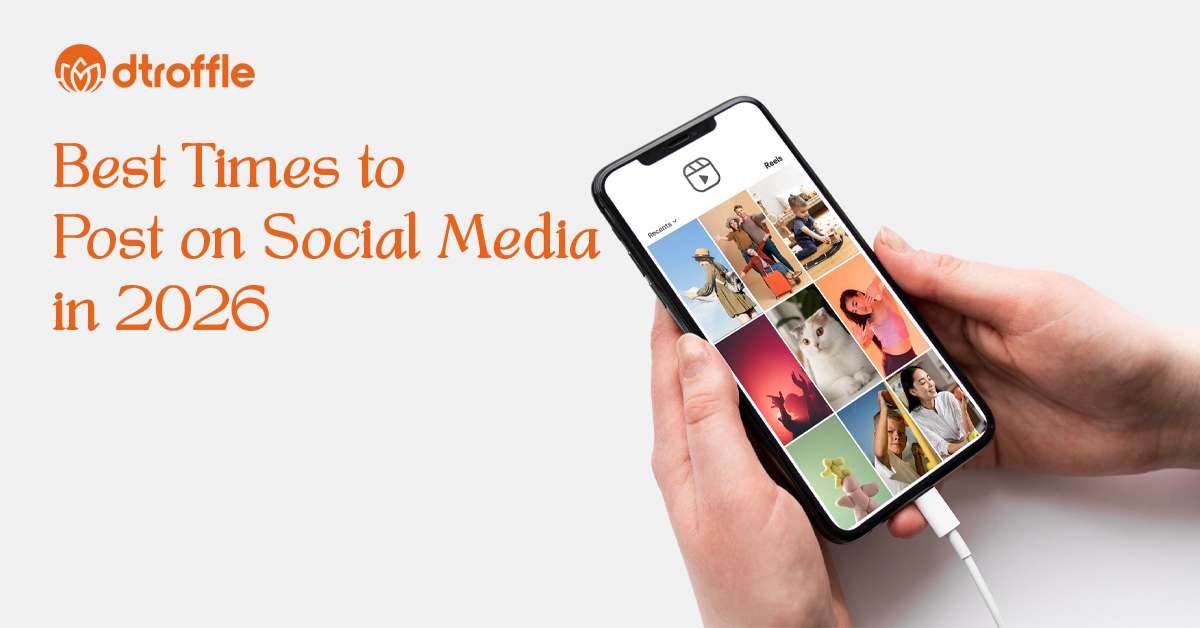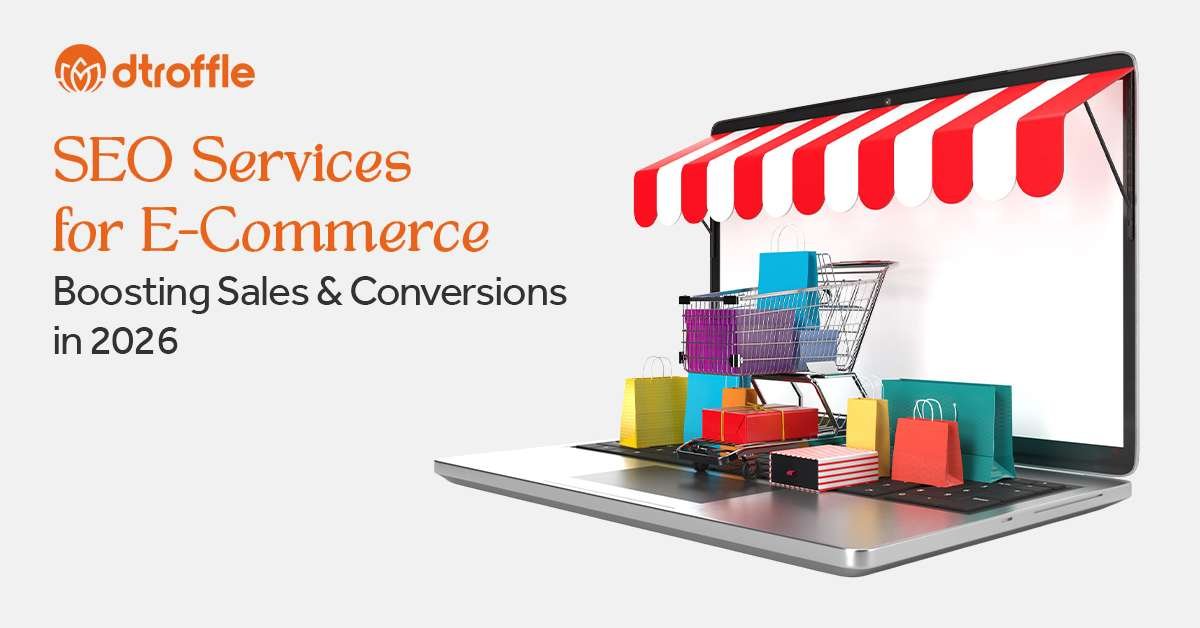10 Best Examplees of AI in Marketing: In the past few years, you must have noticed or heard that the number of companies using AI in marketing is increasing rapidly. Even many popular universities have started offering courses in AI marketing. This means the future of AI marketers is bright.
The DTROFFLE team has conducted research on AI in marketing across SEO, CRM, e-commerce, customer service, social media, and more. Here, we are sharing our experiences with you, which include the 10 Best Examples of AI in Marketing that we have researched. So, let’s get started.
We believe that these 10 Best Examples of AI in Marketing will help enhance both your understanding and ability to use AI marketing tools in the future. And if your marketing team is not yet using AI solutions in marketing, To be frank- you’ve already fallen quite behind. On the other hand, if you’re already using them, that’s great. But remember, this technology is growing rapidly, and you truly need to keep putting in efforts to stay ahead.
Introduction to AI in Marketing
AI technology, especially generative AI tools is transforming nearly every aspect of modern marketing, from lead generation to customer relationship management, making strategies more efficient and data-driven.
AI-powered tools are delivering real-time, actionable insights into consumer behavior, enabling marketers to make smarter, data-driven decisions. In today’s era, many organizations are using AI to manage social media campaigns, streamline outreach programs, SEO reaserch, content optimization, optimize digital ad bidding, segment audiences with precision, enable dynamic pricing, and complete many other tasks-ultimately driving better marketing outcomes.
Best Examples of AI in E-Commerce in Marketing
1. Amazone AI E-Commerce Solution

Amazon is one of the earliest companies to adopt AI in e-commerce, with a relationship that goes back almost 21 years or more. You’ve probably heard about Amazon’s virtual assistant, Alexa, which has made it one of the most recognized companies worldwide. In other words, we can say that Amazon is an excellent example of AI in e-commerce marketing.
AI is deeply integrated into every aspect of Amazon’s e-commerce business. On the customer-facing side, it not only provides personalized product recommendations and speech recognition-enabled shopping but also leverages real-time data analytics to understand consumer behavior and display the right products at the right time. On the backend, AI powers robotics, warehouse automation, and smart logistics, making the supply chain faster, more accurate, and cost-efficient. In this way, whether it’s the customer-facing frontend or inventory and delivery management at the backend, Amazon has used AI as the engine that drives its entire e-commerce ecosystem.
2. Walmart an Example of AI in E-Commerce in Marketing

According to the CNBC report published in March 2023, Walmart, the world’s largest retailer, uses AI extensively to enhance its marketing and improve customer experiences. With a massive network of 4,700 Walmart stores and 600 Sam’s Club outlets across the United States, along with a hugely popular online grocery service and shopping app, Walmart has access to enormous amounts of customer data. This data is used to train and refine its AI models, making them smarter and more effective.
Walmart’s use of AI goes beyond marketing—it’s deeply embedded in store operations as well. For example, the company has deployed robotic floor cleaners equipped with inventory intelligence towers. These machines scan products on store shelves and send instant alerts to warehouses whenever stocks are running low. In this way, Walmart ensures that customers always find what they need, while simultaneously making its supply chain faster, more efficient, and highly responsive.
AI Powered Marketing Automation CRM is The Best Examples of AI in Marketing
3. Hubspot AI Solution

HubSpot’s AI solution is designed to simplify and accelerate marketing workflows through two main tools-ChatSpot and Content Assistant.
- ChatSpot: A conversational CRM that integrates seamlessly with HubSpot. With ChatSpot, marketing professionals can perform everyday CRM tasks through simple chat or voice commands rather than manual data entry. From sending follow-up emails and creating new contacts to generating reports and pulling customer data, ChatSpot helps teams save valuable time and stay more productive.
- Content Assistant: An AI-powered writing assistant built directly into HubSpot. This tool helps marketers generate personalized marketing and prospecting emails, engaging social media posts, blog ideas, and compelling CTAs (calls-to-action). By reducing the time spent on content creation, it enables teams to focus on strategy, creativity, and customer engagement.
How It Bnefits the Businesses:
HubSpot’s AI tools benefit businesses by saving time, boosting productivity, and reducing manual work through automation. ChatSpot simplifies CRM tasks with voice or chat commands, while Digital marketing content optimization Assistant creates personalized emails, posts, and CTAs in seconds. Together, they improve content quality, enhance personalization, cut costs, and help teams make smarter, data-driven decisions faster.
4. Netflix’s An Example of AI in Marketing

Netflix is a subscription based streaming plateform where user pay a recurring subscription fee (Monthly or Yearly) to acces a library of video content including movies, TV Shows, web series, documetries, etc at any time, rather than pursuing or renting ndividual titles. It is another example of AI in Marketing.
Netflix has achieved a significant part of its extraordinary success through its advanced use of AI. User Experience (UX) is extremely important, and Netflix uses AI-driven machine learning to provide highly personalized content recommendations based on users’ preferences and viewing history. Additionally, AI helps optimize streaming quality in real time on Netflix and prevents buffering issues, ensuring a seamless experience. Currently, over 80% of the shows watched on Netflix come from its personalized recommendation system. Let’s understand in detail:
- Personalized Recommendations: Netflix uses AI-driven algorithms to analyze viewing history, search behavior, and ratings. This helps suggest movies and shows that are most likely to interest each subscriber, keeping users engaged longer.
- Content Creation & Acquisition: AI predicts what kind of shows or movies will perform well by analyzing trends, viewer preferences, and demographic data. This guides decisions on which content to produce or license.
- Dynamic Streaming Quality: AI optimizes video streaming in real-time based on network conditions and device type. This ensures smooth playback, reduces buffering, and improves the viewing experience.
- Marketing & Retention: Netflix uses AI to personalize marketing emails, notifications, and in-app banners. This helps attract new subscribers and retain existing ones by showing relevant content.
- Efficient Search & Categorization: AI automatically tags and categorizes content into genres, moods, or themes. This improves search functionality and makes it easier for users to find what they want.
In short, AI helps Netflix understand its audience, deliver better experiences, and make smarter business decisions, which has been a major factor in its global success.
Also Read:
- Micro-Influencer Marketing | Why Small is the New Big in 2026
- SEO Services for E-Commerce: Boosting Sales and Conversions in 2026
- Learn How to Write a Perfect Blog With Dtroffle in 2026
- Tips to Create High-Quality Content in 2026 | Proven Strategies
- How to Create a Social Media Calendar in 2026





